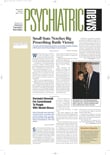Last month President George W. Bush sent Congress his proposed budget for all federal agencies for Fiscal 2004, setting in motion the appropriations process in Congress.
The National Institutes of Health will have to operate on a drastically reduced budget in Fiscal 2004 if Congress approves the president’s proposed increase of 2 percent. Congress has traditionally appropriated more funding for NIH than the president requested, but there is more pressure on Congress now to control spending in areas unrelated to terrorism and national security.
NIH budget administrators are worried that the sharp decrease in funding will impede its ability to sustain multiyear research grants initiated in the last few years.
APA President Paul Appelbaum, M.D., said in a press release, “Under Bush’s proposed plan to fund the entire NIH at $27.9 billion in Fiscal 2004, the number of nonbioterrorism research grants awarded by the NIH next year will drop—a decline that previously occurred only once since 1989. This is disappointing and fails to capitalize on the life-saving treatments within our reach.”
APA, as a member of the Mental Health Liaison Group, has successfully advocated that Congress double the NIH budget from $13.6 billion in 1998 to $27.2 billion in the current fiscal year.
To maintain that funding momentum, APA and the National Alliance for the Mentally Ill (NAMI) support a resolution introduced in the Senate last October (S Res 347). The resolution’s sponsors, Sens. Arlen Specter (R-Pa.) and Tom Harkin (D-Iowa), call for tripling the NIH budget over a five-year period. To accomplish that goal, 9 percent annual increases are necessary in the NIH budget beginning in Fiscal 2004 and ending in Fiscal 2008, according to remarks by Specter in the October 17, 200, Congressional Record.
Appelbaum commended the president for proposing 3.6 percent more in fiscal 2004 than he proposed last year for the National Institute of Mental Health (NIMH).
If Congress approves the increase, this could result in $1.38 billion for NIMH scientific and clinical research. However, the increase is less than half the 8 percent or 9 percent increases previously designated by Congress, according to APA.
Appelbaum also applauded the president’s proposed $10 million increase for the Children’s Mental Health Program, which provides grants to states to provide community-based services to children with serious emotional disorders.
The president also proposed an increase of $3 million, for a total of $50 million, in Fiscal 2004 for the Projects for Assistance in Transition from Homelessness (PATH). This is a state-administered grant program to fund community-based services for homeless individuals with mental illness.
The increased funding is part of a new Bush administration initiative to refocus federal homeless spending and end chronic homelessness within the next decade. The initiative includes activities at several federal departments, including the departments of Veterans Affairs and Housing and Urban Development, according to NAMI.
The president also proposed a large increase of $194 million for Fiscal 2004 for substance abuse treatment programs at the Center for Substance Abuse Treatment. Part of the funding will be directed to a new Bush administration voucher program at the state level that would improve the ability of faith-based substance abuse treatment programs to compete for federal funds, according to the NAMI press release.
APA is concerned about the proposed freeze in funding for certain critical programs including the Mental Health Block Grant and the Protection and Advocacy for Individuals With Mental Illness program through the Center for Mental Health Services, according to APA. The Mental Health Block Grant is administered by the states to fund programs serving people with severe mental illnesses and children with severe emotional disturbances.
The president’s budget also proposes giving the states federal block grants for certain categories of Medicaid beneficiaries rather than designating specific grants for them (see
page 5).
“APA is extremely concerned that such changes may lead states to drop beneficiaries and cut benefits,” said Appelbaum. “That could have a devastating effect on the millions of low-income people with mental illness for whom Medicaid is the only option.”
APA is looking forward to working with the Bush administration to ensure that the necessary research and funding exist for patients with mental illness and substance abuse disorders, Appelbaum noted. ▪

